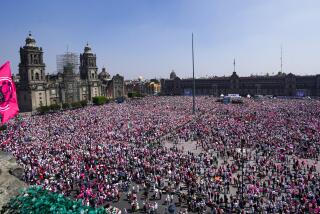Student March Peaceful; Madrid Ministry Attacked
- Share via
MADRID — Masked youths attacked the Spanish Education Ministry with gasoline bombs, clubs and chains Wednesday after a peaceful march by thousands of students protesting national education policies.
Protest marches were held in other cities as well. Rioters hurled gasoline bombs at government buildings in the Basque city of Bilbao, and demonstrators clashed with police in Murcia and Huesca, Spanish national radio RNE reported.
About 200 youths, swinging clubs and chains and throwing stones, smashed windows in the four-story Education Ministry in downtown Madrid as thousands of high school and university students arrived at the end of a peaceful protest march.
The masked rioters also destroyed telephone booths, overturned cars, set fires and fought with organizers of the protest march.
Several youths tossed gasoline bombs at the building but caused little damage.
Police arrived and chased the rioters down narrow side streets.
Six youths were arrested, and one policeman was injured in clashes with the marauders that lasted for about an hour, police officials said.
“They’ve sabotaged our demonstration,” sobbed 19-year-old university law student Immaculada Lopez, referring to the rioters.
The students’ march was held to demand abolition of university entrance examinations, a minimum wage for students and increased government spending on education.
Madrid government spokesman Juan Gil said there were between 5,000 and 10,000 marchers, but organizers and witnesses put the number closer to 50,000.
Gil said the Students’ Union, which organized the march with the Communist-oriented Workers Commissions union, had guaranteed that the demonstration would be peaceful, so no police were placed along the route or at the ministry.
However, more than a dozen police vans and several companies of riot police were stationed outside the Parliament building two blocks away. Police have clashed with rowdy youths in recent student demonstrations.
Students also marched in Seville, Santander, Zaragoza, Gijon and Vitoria, RNE radio said.
Many of the marchers questioned in Madrid said they came from working-class families and were afraid they would be denied a university education because of the restrictive examinations.
A 15-year-old girl who identified herself as Rosa said she wanted to go to the university, “but if things don’t change, it’s going to be just like in Franco’s time when only rich kids could go.”
Under the 1939-75 authoritarian regime of Gen. Francisco Franco, public secondary education in Spain was neglected in favor of schools run by the Roman Catholic Church, and university education was restricted.
A recent ministry study indicates less than 20% of Spanish university students are from working-class families.
Education Minister Jose Maria Maravall met Wednesday with representatives of the Students’ Union, one of three main groups backing the protests that began Dec. 4 with classroom boycotts and street demonstrations.
Later, the Students’ Union rejected Maravall’s offer to reform university examinations and said it would keep up its classroom boycotts and demonstrations.
More to Read
Sign up for Essential California
The most important California stories and recommendations in your inbox every morning.
You may occasionally receive promotional content from the Los Angeles Times.













